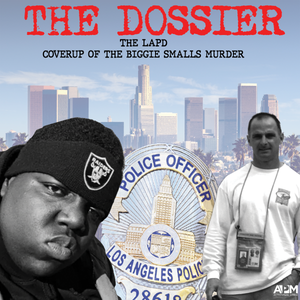
The Dossier
ActionPark Media
FBI Agent Phil Carson has held onto a secret for fifteen years, which will prove for the final time that there was a cover-up of the murder of Hip-Hop Superstar The Notorious B.I.G. by officials at the LAPD. Agent Carson is talking,...
- 29 minutes 33 secondsFAMILY BUSINESS: GREG SMITH
Organized crime has always been catnip to savvy crime reporters, and as the years have progressed with the proliferation of rats, the storytelling has gotten more nuanced and more in depth.
Former NY Daily News Reporter Greg Smith spent years reporting on orga-nized crime, and in 2003 he published a wide-ranging book on the DeCavalcante clan, and their hijinks.
Learn more about your ad choices. Visit megaphone.fm/adchoices
29 January 2025, 10:00 am - 26 minutes 28 secondsFAMILY BUSINESS: SAM THE PLUMBER
The Sopranos considered by many the greatest show in television history, made the New Jersey mafia water cooler talk across the country from 1999-2007.
While based on fictional characters, there was an actual mafia family neck deep in criminal activities across the Hudson River from their La Cosa Nostra contemporaries in New York.
In New Jersey, starting in the 1960’s, the DeCavalcante family ran the show and are considered the inspiration for many of The Sopranos characters and storylines that fans are familiar with today.
This season on FAMILY BUSINESS, we will look at the rise and fall of the DeCavalcante family. Sometimes truth is even more colorful than fiction...
Family Business is an 8 episode investigative audio documentary focused on the most notorious mafia crime families and their impact and relationship with Hollywood. Each season we will take on another family, another city, and another set of nefarious, deadly and sometimes even comical, characters and their stories.
We begin Season One with the DeCavalcante crime family based in Northern New Jersey.
The DeCavalcante crime family is an Italian American crime family that operates in Northern New Jersey, particularly in Elizabeth, Newark and the surrounding areas in North Jersey and it operates on the opposite side of the Hudson, from the Five Families of New York, but it maintains strong relations with many of them, as well as with the Philadelphia Crime Family and the Patriarca Crime Family of New England, Its illicit activities include bookmaking, cement, and construction violations, bootlegging, corruption, drug trafficking, extortion, fencing, fraud, hijacking, illegal gambling, loan-sharking, money laundering, murder, pier thefts, pornography, prostitution, racketeering, and waste management violations. Interviews with informants,
gangsters, defense lawyers, cops, family members, and journalists weave a true-crime tale.
In Episode One, we will trace the rise & fall of the family, beginning with Sam 'The Plumber.’ DeCavalcante.
Sam was a sitting member of The Commission, allowing his family a seat at the table with the 5 families that ran La Cosa Nostra in New York.
We will discuss Sam 'The Plumber’s' career in crime & his arrests, leading to his semi-retirement to Florida.
Learn more about your ad choices. Visit megaphone.fm/adchoices
22 January 2025, 10:00 pm - 33 minutes 56 secondsUSA VS HIP HOP EP. 7
In hip hop, the end of the 80s ushered in a thriving music industry, with hip hop, diversifying itself immensely.
In 1990 alone, A Tribe Called Quest, Public Enemy, Ice Cube, D Nice, Special Ed, LL Cool J, Vanilla Ice, and EPMD all had seminal releases.
These artists would start to define the trajectory of hip hop music as it invaded white suburbs and penetrated the minds of American political thought as hip hop started to gain in popularity.
The traumatic events inside the crack epidemic and the war on drugs resulted with draconian drug sentences, and most of the major drug kingpins facing huge life sentences or death.
The crack trade that spawned 1000s of corner millionaires was now coming home to roost, and its path of destruction was young men and women just out of their teenage years, being shipped to federal and state jails for 30 year and two life sentences.
Learn more about your ad choices. Visit megaphone.fm/adchoices
11 December 2024, 10:00 am - 33 minutes 35 secondsUSA VS HIP HOP EP. 6
There were many defining events as it relates to the intersection of crime, the War on Drugs, and hip hop throughout the 80s.
That being said, there was a singular event that took place in Southside Jamaica, Queens, in February of 1988 that arguably changed the course of policing in this country, the mythology of the drug trade, and symbolically ended the crack era for the exalted hustlers inside New York City.
This event was the execution of a rookie NYPD Cop named Edward Byrne.
The NYPD, led by Chief Bill Bratton, would form the Tactical Narcotics Team, aimed at systematically taking down all drug crews in the city.
In part 2 of our interview with Prince Miller, he discusses the ramifications of Ed Byrne’s murder and Fat Cat Nichols' cooperation with the government leading to the fall of The Supreme Team.
**If you’re a fan of The Dossier, please visit our Patreon page for free and paid content featuring exclusive documents, unedited interviews, and monthly online meetups with other Dossier fans and the Dossier team.
Go to Patreon.com/Dossier to subscribe!!
Learn more about your ad choices. Visit megaphone.fm/adchoices
4 December 2024, 10:00 am - 37 minutes 25 secondsUSA VS HIP HOP EP. 5
The years of 1987 and ’88 ushered in the golden age of hip-hop, when a few groundbreaking artists, acting as cultural critics, show the power of this art form.
Led by the protest rap of KRS-One, Public Enemy, Eric B & Rakim, among others, hip-hop was now shining a light on the plight of the inner-city struggle, the crack epidemic, mass incarceration & other societal plights.
The presidential race of 1988 is filled with subtle racial dog whistles, aimed at scaring white America into voting for George H Bush.
On the West Coast, we witness the rise of LA street gangs such as the Bloods & Crips, while NWA releases the seminal album Straight Outta Compton.
**If you’re a fan of The Dossier, please visit our Patreon page for free and paid content featuring exclusive documents, unedited interviews, and monthly online meetups with other Dossier fans and the Dossier team.
Go to Patreon.com/Dossier to subscribe!!
Learn more about your ad choices. Visit megaphone.fm/adchoices
27 November 2024, 10:00 am - 31 minutes 45 secondsUSA VS HIP HOP EP. 4
As hip hop and the war on drugs hit the mid 1980s, it can be argued that both commercial endeavors hit their strides in inner cities across the United States.
As crack cocaine exploded, members of the United States government enacted one of the first steps in the revolution of our criminal justice system in soaring incarceration rates.
The comprehensive Crime Control Act of 1984 was the first revision of the US Criminal Code since the early 1900s.
It was sponsored by a racist Strom Thurmond, a Republican from South Carolina in the Senate, and by Hamilton Fish, a Republican from New York.
**If you’re a fan of The Dossier, please visit our Patreon page for free and paid content featuring exclusive documents, unedited interviews, and monthly online meetups with other Dossier fans and the Dossier team.
Go to Patreon.com/Dossier to subscribe!!
Learn more about your ad choices. Visit megaphone.fm/adchoices
20 November 2024, 10:00 am - 42 minutes 45 secondsUSA VS HIP HOP EP. 3
If any story defines what New York was like at that time, it's the story of New York City subway vigilante Bernard Goetz's shooting of unarmed black teens.
On December 22, 1984, Barry Allen, Troy Canty, Darrell Cabey, and James Ramseur were shot and wounded by Bernard Goetz after they accosted him on a New York City subway train in Manhattan.
In America, you would think that we would learn from our mistakes as it relates to race, class, and the divisions that have been created.
One could see this case taking place in 2024, with protests in the cable news wars elevating it into the mainstream.
In the first two episodes, we set the stage in the early 1980s with iconic hip-hop drug kingpins who came to define an era.
Those names are "Freeway" Rick Ross in Los Angeles, Lorenzo "Fat Cat" Nichols in Queens, Guy Fisher in Harlem, And finally, a mention of a crew called the Supreme Team.
These early kingpins were the table setters for what would become a new breed of hustling and the young men from Queens who launched a business idea that would revolutionize the drug trade forever.
In the Bible of hip-hop gangsters, Kenneth "Supreme" McGriff and Gerald "Prince" Miller of the Supreme Team were the top dogs.
**If you’re a fan of The Dossier, please visit our Patreon page for free and paid content featuring exclusive documents, unedited interviews, and monthly online meetups with other Dossier fans and the Dossier team.
Go to Patreon.com/Dossier to subscribe!!
Learn more about your ad choices. Visit megaphone.fm/adchoices
19 November 2024, 3:50 am - 47 minutes 12 secondsUSA VS HIP HOP EP. 2
In the dynamic early years of hip hop, you could still see the influences of the disco era in the fashion the samples, and the party music played via car stereos in different neighborhoods in New York City.
The hip-hop releases for 1982 and 1983, included Wildstyle the first feature film to reveal the nuances of hip-hop culture written by Fab Five Freddy and directed by Charlie Ahern.
The film explores the work of artists such as Lady Pink, Daze, Grandmaster Flash, and the Rock Steady Crew.
Hip Hop goes international with a tour featuring Afrika Bambaataa, Fab Five Freddy, Double Dutch Girls, and fashion icon Dapper Dan opened his first boutique in Harlem, while Edward Koch is the mayor of New York City.
There's a case to be made that inside neighborhoods in New York City, hustlers still slinging heroin operate almost with impunity, as local police forces are overworked and underfunded.
In 1982, & '83, there's a young man who is starting to corner the market for illicit narcotics, and that man is Lorenzo "Fat Cat" Nichols.
**If you’re a fan of The Dossier, please visit our Patreon page for free and paid content featuring exclusive documents, unedited interviews, and monthly online meetups with other Dossier fans and the Dossier team.
Go to Patreon.com/Dossier to subscribe!!
Learn more about your ad choices. Visit megaphone.fm/adchoices
19 November 2024, 3:49 am - 35 minutes 19 secondsUSA VS HIP HOP EP. 1
In America in 2024, we have all watched major American cities burn the result of a powder keg that exploded around incidents of police killings. We should all know the names by now: George Floyd, Trayvon Martin, Breanna Taylor, Stephon Clark, Philando Castille, and more.
As the list goes on, the debate surrounding race, policing, mass incarceration, and the war on drugs, it seems, has reached the tipping point. Fault lines have been drawn as our divided country simmers in a cauldron of internet conspiracy theories and news stories that may or may not be true. Commonly held facts and assumptions that should guide any democracy are hanging by a thread.
To understand the vast societal shifts in contemporary America and the proposition of understanding where we are now, we have to analyze it through the eyes of an art form that, for close to 40 years, arguably has been the voice of many generations and an analytical mirror that has reflected the ills of the United States of America.
That art form is Hip Hop.
In an irony-filled twist of fate, the music that has caused thousands of controversies, internal war, and conflict has come to define America in 2024.
This proposition is not easy, and the narrative will go down many roads.
USA vs. Hip Hop will tell this 40-year story through the eyes of the gangsters, the cops, and the artists who wrote the lyrics and created visuals that not only have shifted the world, but are a living and breathing experiment where Crime and Punishment can be unpacked and traced.
The starting point for our story is in two places:
First New York City in 1980, as Reaganomics left the poor to rot, a new form of music was born in the South Bronx. Over in Harlem, Nicky Barnes, one of the 70’s biggest drug kingpins, decides to cooperate with the government against his fellow members of The Council.
On the Left Coast, 1981 was engulfed with a crime wave in Oakland, California. While not an obvious place to start any story as it relates to hip-hop music, it is arguably one of the most important geographical cities where the symbiotic relationship between the fall of the Black Panthers and the rise of a young man named Todd Shaw.
This is the 40-year odyssey of The United States of America vs. Hip-Hop.
*Episode Note-We were honored to have Executive Producer Ice-T narrate Episode One!
**If you’re a fan of The Dossier, please visit our Patreon page for free and paid content featuring exclusive documents, unedited interviews, and monthly online meetups with other Dossier fans and the Dossier team.
Go to Patreon.com/Dossier to subscribe!!
Learn more about your ad choices. Visit megaphone.fm/adchoices
19 November 2024, 3:48 am - 2 minutes 33 secondsUSA VS HIP HOP TRAILER
From its start, the art of Hip-Hop music has not only defined our countries generations, it has done so by reporting on social and criminal injustices in America.
Referred to as the “Black CNN,” Hip-Hop music, throughout the past 40 years, has been reporting all of societies major issues and complex policies that remain to this day.
Whether it is the subject of brutal and biased policing, over-crowded jails, marginalized neighborhoods, public education, and the imbalance of economic wealth — it has been holding up a mirror to the world casting a dark reflection of the state of our country.
Rappers are the voice of poor, urban African - American youth, whose lives are dismissed or misrepresented by the mainstream media.
Hip-Hop music, with its African roots, has become an American art that reflects itself and the times in our country in profound ways. A country at war with itself, is also at war with Hip-Hop.
The music in 2024 has transcended race and class; it has become intertwined with the American Dream and the Amerikkkan Nightmare.
Executive Produced by Ice T, USA vs. Hip-Hop, will trace in chronological order the defining events of the music as it pertains to criminal justice, the connection between federal & state law enforcement, mass incarceration, social justice reform, and public policy.
These singular events defined the music, and how Americans have categorized race and American exceptionalism.
You can’t have Hip-Hop without the War on Drugs and vice versa.
This sprawling anthology will outline in sweeping detail — the Hip-Hop stars, American gangsters, and law enforcement agencies that were intertwined in a narrative that strangely connects like a puzzle starting in 1980 to present day.
Learn more about your ad choices. Visit megaphone.fm/adchoices
22 October 2024, 5:34 pm - 1 minute 48 secondsTHE REAL SOPRANOS TRAILER
The Sopranos considered by many the greatest show in television history, made the New Jersey mafia water cooler talk across the country from 1999-2007.
While based on fictional characters, there was an actual mafia family neck deep in criminal activities across the Hudson River from their La Cosa Nostra contemporaries in New York.
In New Jersey, starting in the 1960’s, the DeCavalcante family ran the show and are considered the inspiration for many of The Sopranos characters and storylines that fans are familiar with today. This season on Family Business, we will look at the rise and fall of the DeCavalcante family. Sometimes truth is even more colorful than fiction.
THE PODCAST FRANCHISE FAMILY BUSINESS, is an 8 episode investigative audio documentary focused on the most notorious mafia crime families and their impact and relationship with Hollywood.
Each season we will take on another family, another city, and another set of nefarious, deadly and sometimes even comical, characters and their stories.
We begin Season One with the DeCavalcante crime family based in Northern New Jersey.
The DeCavalcante crime family is an Italian American crime family that operates in Northern New Jersey, particularly in Elizabeth, Newark and the surrounding areas in North Jersey and it operates on the opposite side of the Hudson, from the Five Families of New York, but it maintains strong relations with many of them, as well as with the Philadelphia Crime Family and the Patriarca Crime Family of New England.
Its illicit activities include bookmaking, cement, and construction violations, bootlegging, corruption, drug trafficking, extortion, fencing, fraud, hijacking, illegal gambling, loan-sharking, money laundering, murder, pier thefts, pornography, prostitution, racketeering, and waste management violations. Interviews with informants, gangsters, defense lawyers, cops, family members, and journalists weave a true-crime tale/
Learn more about your ad choices. Visit megaphone.fm/adchoices
16 October 2024, 12:53 am - More Episodes? Get the App
Your feedback is valuable to us. Should you encounter any bugs, glitches, lack of functionality or other problems, please email us on [email protected] or join Moon.FM Telegram Group where you can talk directly to the dev team who are happy to answer any queries.
 Drink Champs
Drink Champs
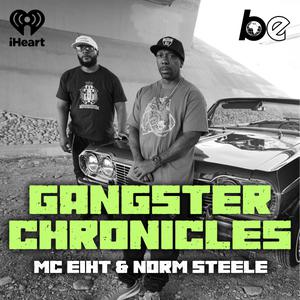 The Gangster Chronicles
The Gangster Chronicles
 Victory the Podcast
Victory the Podcast
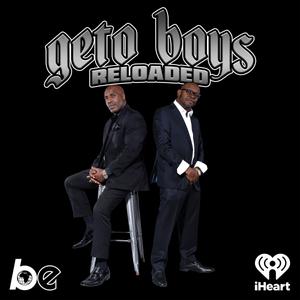 Geto Boys Reloaded
Geto Boys Reloaded
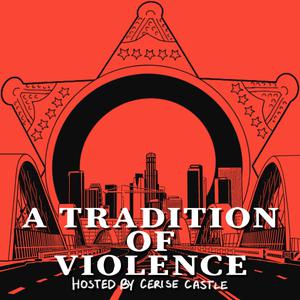 A Tradition of Violence
A Tradition of Violence
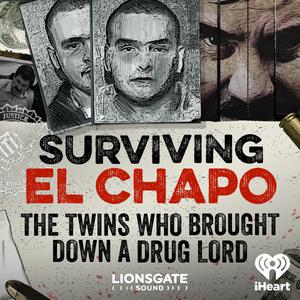 Surviving El Chapo: The Twins Who Brought Down A Drug Lord
Surviving El Chapo: The Twins Who Brought Down A Drug Lord